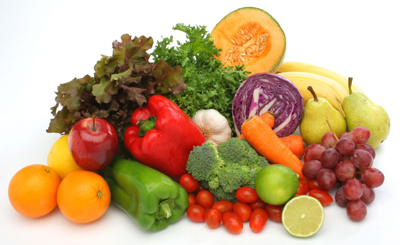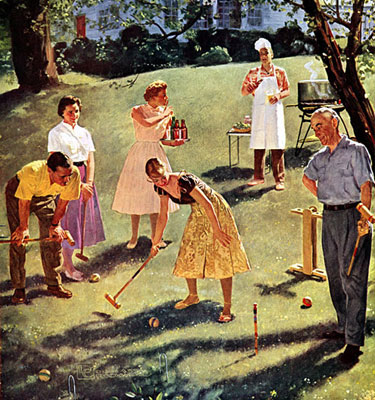 I’m a middle-aged step-dad with a bad back. I’m unable to jog. But I have a better shot at qualifying for the one-hundred-yard dash in the next summer Olympics than I have at getting my thirteen-year-old to voluntarily eat a vegetable. Any vegetable. And the same can be said for fruit. “I hate them,” he insists, decrying, at one fell swoop, all means of natural nutrition. “Hate is a strong word, pal,” I tell him, trying to lend some perspective to this same conversation we repeat night in and night out. But if this isn’t hate, I think to myself, what is it? The smell of broccoli makes him nauseas. The sight of a mushroom incapacitates him with fear; one found its way on to his dinner plate a couple of weeks ago and he yelled out, panicked “Get it off of there!” as if it were some alien species about to attack him.
I’m a middle-aged step-dad with a bad back. I’m unable to jog. But I have a better shot at qualifying for the one-hundred-yard dash in the next summer Olympics than I have at getting my thirteen-year-old to voluntarily eat a vegetable. Any vegetable. And the same can be said for fruit. “I hate them,” he insists, decrying, at one fell swoop, all means of natural nutrition. “Hate is a strong word, pal,” I tell him, trying to lend some perspective to this same conversation we repeat night in and night out. But if this isn’t hate, I think to myself, what is it? The smell of broccoli makes him nauseas. The sight of a mushroom incapacitates him with fear; one found its way on to his dinner plate a couple of weeks ago and he yelled out, panicked “Get it off of there!” as if it were some alien species about to attack him.
Complicating his life, not to mention mine, is his mother, who insists he eat, at the very least, one serving of a vegetable at dinner. After negotiations rivaling the Geneva Talks in intensity, we have agreed to let him eat the vegetable of his choosing – peas, peas, and occasionally some peas – at the very end of his meal, and on a separate plate – his vegetable plate. This is the only way he’ll consider, in his words, “giving it an honest attempt.” While his strategy strikes me as odd and unnecessarily painful, I accept it. Early on I tried to convince him that I could effectively camouflage his peas in each nights main course. “No,” he replied with surprising calm, “I don’t want to contaminate the part of the meal that doesn’t completely stink.” The fact that I felt complimented by this remark illustrates the extent to which our family ship can, on occasion, veer off course.
Night after night, our dinner proceeds predictably. We each talk about out day. Julian remains talkative and upbeat as long as there is no mention of vegetables. Rose and I may enjoy all the vegetables we desire, but we refrain from identifying them by name. This along with Julian’s plate remaining vegetable-free assures a relatively pleasurable dining experience. Well, pleasurable for him: while he’s in his comfortable world of denial, I’m shoring myself up for the battle that is to come.
 Surely enough, two-thirds into our meal this evening his mood begins to noticeably dip. His conversation, once lively and effusive, becomes restrained. He glances at Rose’s and my near empty plates and wonders aloud, “Why are you guys eating so fast?” I take a deep breath. Then, in the compassionate voice I normally reserve for my cat when she’s at the veterinarian’s getting an injection, I say to him, “Okay, Pal, let’s eat our vegetable.” I pick up his empty plate, and before I can spoon one pea onto it, he gives me the look. The look that says, “Why are you doing this to me, Don? I thought we were friends.” I coax him, gently. “Come on, Pal. I put plenty of butter on them for you.” This is the truth.
Surely enough, two-thirds into our meal this evening his mood begins to noticeably dip. His conversation, once lively and effusive, becomes restrained. He glances at Rose’s and my near empty plates and wonders aloud, “Why are you guys eating so fast?” I take a deep breath. Then, in the compassionate voice I normally reserve for my cat when she’s at the veterinarian’s getting an injection, I say to him, “Okay, Pal, let’s eat our vegetable.” I pick up his empty plate, and before I can spoon one pea onto it, he gives me the look. The look that says, “Why are you doing this to me, Don? I thought we were friends.” I coax him, gently. “Come on, Pal. I put plenty of butter on them for you.” This is the truth.
His peas—all thirty-six of them—are awash in butter. This is only way he will eat them. After a series of fits and starts I have arrived at the winning formula: a disturbing twelve peas per one teaspoon of butter. That’s three teaspoons of butter every night, not including the butter I use to cook the entrée. How many other parents are out there, I ask myself, killing their children with animal fat, just to get them to eat a vegetable?
“Not so much!” he remonstrates, as I spoon the bird’s portion onto his plate. “Why do I have to eat these?” he asks, bewildered, as if he’s never asked and I have never answered this same question every night for what seems like an eternity. “We need our vegetables, Pal.” “But I’m doing fine without them. Look at me!” This is a difficult point to argue. He looks healthy enough. But don’t most thirteen-year olds? Here’s where I have to be a little creative. “You’re doing fine now, Julian. But vegetables aren’t about now. They’re about later. You’re setting up your body to function at its maximum capacity for when you’re going to need it the most.” “And when is that?” he asks, suspiciously. “Maybe tomorrow,” I tell him, “Or the day after that. Kids that eat vegetables don’t get sick as much. That’s a fact.”
 I watch as he carefully weighs my words. His attention slowly shifts to the peas that are staring at him from his bowl. This is an important step. His little mind is working, struggling to find a clear path to those peas. While he’s not close to actually eating them, this step transitions him to the next step, which is staring emptily into the bowl for a minute. Here I must remind myself to remain patient. Tonight my patience is rewarded. He tentatively picks up his fork and begins to circle the bowls inner perimeter to see what kind of sound he can create. “Eat your peas,” I whisper, hypnotically. The circling momentarily stops as he tests the prongs of the fork against the peas.
I watch as he carefully weighs my words. His attention slowly shifts to the peas that are staring at him from his bowl. This is an important step. His little mind is working, struggling to find a clear path to those peas. While he’s not close to actually eating them, this step transitions him to the next step, which is staring emptily into the bowl for a minute. Here I must remind myself to remain patient. Tonight my patience is rewarded. He tentatively picks up his fork and begins to circle the bowls inner perimeter to see what kind of sound he can create. “Eat your peas,” I whisper, hypnotically. The circling momentarily stops as he tests the prongs of the fork against the peas.
Though every fiber of my being is focused on him, I dare not stare. Instead, a book in hand, I pretend to read. Any look from me, no matter how supportive, he’ll construe as pressure. At this juncture he can do one of two things: slowly and tortuously eat the peas, or waste another chunk of the time allotted to me on this earth screwing with my head. Tonight he chooses the latter. “Blake Griffin is a shoe in for the all star team this year,” he says, dropping his fork with finality into the bowl. “Yeah, he’s playing great,” I respond, my heart sinking. “Eat your peas.” “He’s better than the Spaniard,” he adds, trying once more to engage me. The Spaniard is Pau Gasol, the Lakers power forward, and my favorite player. But I decide to pass on his coy invitation for sports talk. Dinner is over.
Rose is already upstairs reading. And I too would like to be upstairs reading. Instead I’m downstairs, pretending to read, trying to outwit a vegetable-resistant thirteen-year old. He stares into his bowl once more. I stare into it as well, and notice that the butter is re-hardening; the sign that tells me it’s time to produce my ace in the hole. “I bought some ice cream today—Ben and Jerry’s. I’d love to give you some, but I can’t unless you eat your peas.” “How about if I eat half of them?” he says shooting a hopeful look my way. I consider his offer. But when I realize he’s negotiating me down to eighteen peas, I’m ashamed at myself for entertaining the suggestion. “No.” I tell him, leaving no room for debate. He stares back into the bowl. Then back at me. “How much ice cream are you going to let me eat?” “Enough to make you happy,” I tell him, sounding like a drug pusher. “How ‘bout I eat three quarters of them.” And that does it. Losing all measure of civility, I pick up a nearby spoon, load it with peas, and place it in front of his mouth. “Eat the damn peas, you little fart. Now!” And what do you know? Grimace by grimace he does.
“Can I have my ice cream now?” he asks. “In the freezer” I tell him, “no more than two scoops.” I add up his evening’s intake: seventy-eight grams of fat and thirty-six peas. I’m a loser. Bowl of ice cream in hand, he turns on the television to watch his prerecorded episode of Jon Stewart, his God. “Make sure you’re in bed by nine.” I tell him, walking toward the stairs, defeated. “Mom said I could stay up until nine-thirty,” he replies, dropping a spoonful of ice cream on the family room couch. “Sorry about that,” he offers, sincerely. Exhausted, I turn and start to walk up the stairs, briefly feeling like an old man ... until I hear the joyous sound of his laughter ...
Don Seigel is a comedy writer and producer whose credits include such hits as the "Golden Girls" "The John Larroquette Show" and "Frasier". He lives in Calabasas with his Cuban wife and stepson.


